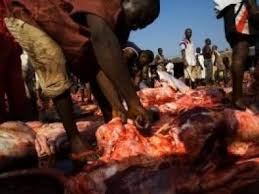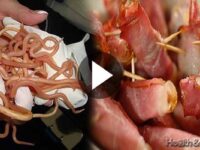 The hygienic conditions at the Kumasi Abattoir, which in 2013 was adjudged the best in the country has been called into question.
The hygienic conditions at the Kumasi Abattoir, which in 2013 was adjudged the best in the country has been called into question.
A Deputy Minister of Food and Agriculture, Dr Hannah Bissiw who paid a working visit to the abattoir early Monday morning described the process leading to the slaughtering of animals as “disgusting” and “not healthy for human consumption”.
Dr Bissiw, a Veterinary Surgeon by profession, gave the description when she paid a surprise visit to the abattoir around 5.30am to ascertain the process and systems that animals go through before they are sent to the various markets for sale and consumption.
Speaking to the management of the abattoir and veterinary officers at a meeting later, she said “I saw very skinny, sick and wasted animal coming for slaughter”.
Graphic Online spotted carcasses being dissected and washed on dirty bare floors inundated with faeces and animal entrails and their contents.
Some small carcasses were also in a pool of very filthy and stinky stagnant water.
“I see animals being dragged for long distances on the floor before they would be slaughtered….. while people dealing with the animals were also not in the prescribed outfit,” she said.
Even before the management of the abattoir could come around, the Deputy Minister had inspected some of the outside facilities, observed some of the animals that had been brought for slaughter at the facility that was adjudged the best in the country two years ago.
Looking at some of the processes outside, the Deputy Minister told the Veterinary Officers at the abattoir that from professional point of view, most of the animals should fail before they reach the veterinary officers table adding that both the officers and the owners of the abattoir “should not take money and endanger the lives of Ghanaians”.
Dr Bissiw was not enthused about how the animals were dragged on the floor to be cut into pieces, the various processes after slaughtering which lend themselves to the spread of diseases, disclosing that “70 per cent of the diseases human beings get were from animals.
“Apart from the people and offices that are nice, there is nothing to write home about, right from the discharge point”, she said and added that “there is a possibility of 99 per cent animal contamination”.
Shocked at the sight of rodents roaming at the abattoir, the Deputy Minister described them as spreading deadly diseases like the deadly Leptospirosis (also known as field fever).
The Deputy Minister ordered the veterinary officers to check the animals before and after slaughter to detect for diseases and ensure that they did not pass on deadly diseases to innocent consumers.
According to the Managing Director of the Abbatoir, Mr J.O. Boadi his outfit had been doing its best under very trying conditions to ensure that the meat from the abattoir were of good quality.
He explained that cost of fuel, electricity and water had been increasing their overhead cost but had always worked in collaboration with stakeholders not to compromise quality.
He said the machines at the place were second hand from a Canadian company but they had been able to manage and used them with some few breaking down and added that they had started the process of procuring some new machines.





